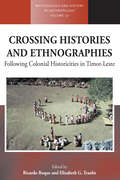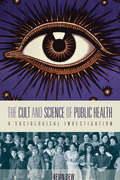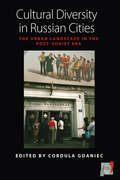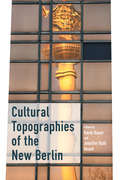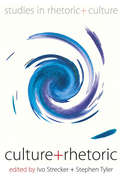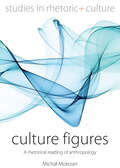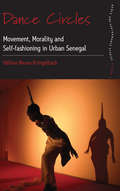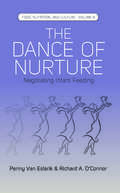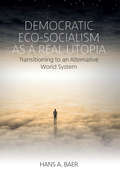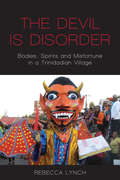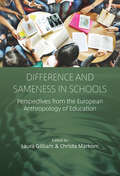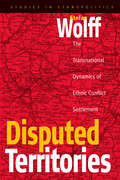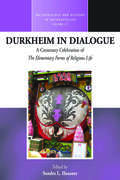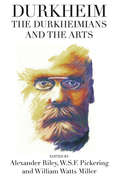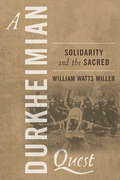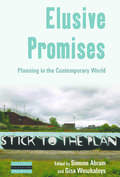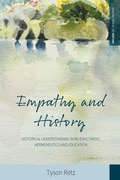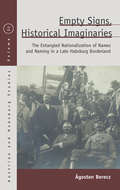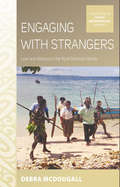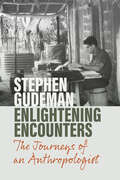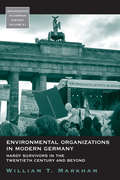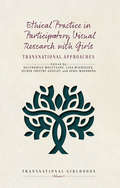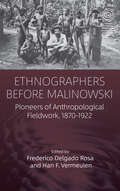- Table View
- List View
Crossing Histories and Ethnographies: Following Colonial Historicities in Timor-Leste (Methodology & History in Anthropology #37)
by Ricardo Roque Elizabeth G. TraubeThe key question for many anthropologists and historians today is not whether to cross the boundary between their disciplines, but whether the idea of a disciplinary boundary should be sustained. Reinterpreting the dynamic interplay between archive and field, these essays propose a method for mutually productive crossings between historical and ethnographic research. It engages critically with the colonial pasts of indigenous societies and examines how fieldwork and archival studies together lead to fruitful insights into the making of different colonial historicities. Timor-Leste’s unusually long and in some ways unique colonial history is explored as a compelling case for these crossings.
Crossing Histories and Ethnographies: Following Colonial Historicities in Timor-Leste (Methodology & History in Anthropology #37)
by Ricardo Roque and Elizabeth G. TraubeThe key question for many anthropologists and historians today is not whether to cross the boundary between their disciplines, but whether the idea of a disciplinary boundary should be sustained. Reinterpreting the dynamic interplay between archive and field, these essays propose a method for mutually productive crossings between historical and ethnographic research. It engages critically with the colonial pasts of indigenous societies and examines how fieldwork and archival studies together lead to fruitful insights into the making of different colonial historicities. Timor-Leste’s unusually long and in some ways unique colonial history is explored as a compelling case for these crossings.
The Cult And Science Of Public Health
by Kevin DewIn contemporary manifestations of public health rituals and events, people are being increasingly united around what they hold in common--their material being and humanity. As a cult of humanity, public health provides a moral force in society that replaces 'traditional' religions in times of great diversity or heterogeneity of peoples, activities and desires. This is in contrast to public health's foundation in science, particularly the science of epidemiology. The rigid rules of 'scientific evidence' used to determine the cause of illness and disease can work against the most vulnerable in society by putting sectors of the population, such as underrepresented workers, at a disadvantage. This study focuses on this tension between traditional science and the changing vision articulated within public health (and across many disciplines) that calls for a collective response to uncontrolled capitalism and unremitting globalization, and to the way in which health inequalities and their association with social inequalities provides a political rhetoric that calls for a new redistributive social programme. Drawing on decades of research, the author argues that public health is both a cult and a science of contemporary society.
Cultural Diversity In Russian Cities
by Cordula GdaniecCultural diversity -- the multitude of different lifestyles that are not necessarily based on ethnic culture -- is a catchphrase increasingly used in place of multiculturalism and in conjunction with globalization. Even though it is often used as a slogan it does capture a widespread phenomenon that cities must contend with in dealing with their increasingly diverse populations. The contributors examine how Russian cities are responding and through case studies from Moscow, St. Petersburg, Novosibirsk, and Sochi explore the ways in which different cultures are inscribed into urban spaces, when and where they are present in public space, and where and how they carve out their private spaces. Through its unique exploration of the Russian example, this volume addresses the implications of the fragmented urban landscape on cultural practices and discourses, ethnicity, lifestyles and subcultures, and economic practices, and in doing so provides important insights applicable to a global context.
Cultural Topographies of the New Berlin
by Karin Bauer Jennifer Ruth HosekSince Unification and the end of the Cold War, Berlin has witnessed a series of uncommonly intense social, political, and cultural transformations. While positioning itself as a creative center populated by young and cosmopolitan global citizens, the “New Berlin” is at the same time a rich site of historical memory, defined inescapably by its past even as it articulates German and European hopes for the future. Cultural Topographies of the New Berlin presents a fascinating cross-section of life in Germany’s largest city, revealing the complex ways in which globalization, ethnicity, economics, memory, and national identity inflect how its urban spaces are inhabited and depicted.
Culture And Rhetoric
by Ivo Strecker Stephen TylerWhile some scholars have said that there is no such thing as culture and have urged to abandon the concept altogether, the contributors to this volume overcome this impasse by understanding cultures and their representations for what they ultimately are - rhetorical constructs. These senior, international scholars explore the complex relationships between culture and rhetoric arguing that just as rhetoric is founded in culture, culture is founded in rhetoric. This intersection constitutes the central theme of the first part of the book, while the second is dedicated to the study of figuration as a common ground of rhetoric and anthropology. The book offers a compelling range of theoretical reflections, historical vistas, and empirical investigations, which aim to show how people talk themselves and others into particular modalities of thought and action, and how rhetoric and culture, in this way, are co-emergent. It thus turns a new page in the history of academic discourse by bringing two disciplines - anthropology and rhetoric - together in a way that has never been done before.
Culture Figures: A Rhetorical Reading of Anthropology (Studies in Rhetoric and Culture #10)
by Michał MokrzanEthnographic research, anthropological theory, and the understanding of the objects of inquiry, are co-created through figuration (using tropes and rhetorical figures) and techniques of persuasion. Delving into descriptive ethnography and theoretical texts spanning across classical monographs and recent texts in cultural anthropology, Culture Figures places rhetoric and rhetoricity as central to the discipline’s self-understanding. It focuses on how understandings of ‘culture’ and social life are shaped and conveyed in cultural anthropology through textual rhetoric. The book demonstrates how processes of using tropes and modes of persuasion underlie the creation of meanings or misunderstandings in society.
Dance Circles
by Helene Neveu KringelbachSenegal has played a central role in contemporary dance due to its rich performing traditions, as well as strong state patronage of the arts, first under French colonialism and later in the postcolonial era. In the 1980s, when the Senegalese economy was in decline and state fundingwithdrawn, European agencies used the performing arts as a tool in diplomacy. This had a profound impact on choreographic production and arts markets throughout Africa. In Senegal, choreographic performers have taken to contemporary dance, while continuing to engage with neo-traditional performance, regional genres like the sabar, and the popular dances they grew up with. A historically informed ethnography of creativity, agency, and the fashioning of selves through the different life stages in urban Senegal, this book explores the significance of this multiple engagement with dance in a context of economic uncertainty and rising concerns over morality in the public space.
The Dance of Nurture: Negotiating Infant Feeding (Food, Nutrition, and Culture #6)
by Penny Van Esterik Richard A. O'ConnorBreastfeeding and child feeding at the center of nurturing practices, yet the work of nurture has escaped the scrutiny of medical and social scientists. Anthropology offers a powerful biocultural approach that examines how custom and culture interact to support nurturing practices. Our framework shows how the unique constitutions of mothers and infants regulate each other. The Dance of Nurture integrates ethnography, biology and the political economy of infant feeding into a holistic framework guided by the metaphor of dance. It includes a critique of efforts to improve infant feeding practices globally by UN agencies and advocacy groups concerned with solving global nutrition and health problems.
Democratic Eco-Socialism as a Real Utopia: Transitioning to an Alternative World System
by Hans A. BaerAs global economic and population growth continues to skyrocket, increasingly strained resources have made one thing clear: the desperate need for an alternative to capitalism. In Democratic Eco-Socialism as a Real Utopia, Hans Baer outlines the urgent need to reevaluate historical definitions of socialism, commit to social equality and justice, and prioritize environmental sustainability. Democatic eco-socialism, as he terms it, is a system capable of mobilizing people around the world, albeit in different ways, to prevent on-going human socio-economic and environmental degradation, and anthropogenic climate change.
The Devil is Disorder: Bodies, Spirits and Misfortune in a Trinidadian Village
by Rebecca LynchWhat role might the Devil have in health and illness? The Devil is Disorder explores constructions of the body, health, illness and wider misfortune in a Trinidadian village where evangelical Christianity is growing in popularity. Based on long-term ethnography and locating the village in historical and global context, the book takes a nuanced cosmological approach to situate evangelical Christian understandings as shaping and being shaped by their context and, in the process, shaping individuals themselves. As people move from local to global subjects, health here stretches beyond being a matter of individual bodies and is connected to worldwide flows and networks, spirit entities, and expansive moral orders.
Difference and Sameness in Schools: Perspectives from the European Anthropology of Education (EASA Series #48)
by Laura Gilliam and Christa MarkomPresenting European Anthropology of Education through eleven studies of European schools, this volume explores the constructing and handling of difference and sameness in the central institutions of schools. Based on ethnographic studies of schools in Greece, England, Norway, Italy, Switzerland, the Czech Republic, Spain, Austria, Russia, Germany, the Netherlands and Denmark, it illustrates how anthropological studies of schools provide a window to larger society. It thus offers insights into cultural lessons taught to children through policies, institutional structures and everyday interactions, as well as into schools’ entanglement in state projects, cultural processes, societal histories and conflicts, and hence into contemporary Europe.
Disputed Territories: The Transnational Dynamics of Ethnic Conflict Settlement (Ethnopolitics #1)
by Stefan WolffEthnic conflicts have shaped the 20th century in significant ways. While the legacy of the last century is primarily one of many unresolved conflicts, the author contends that Western Europe has a track record in containing and settling ethnic conflicts which provides valuable lessons for conflict management elsewhere. Focusing on ethno-territorial crossborder conflicts in Alsace, the Saarland, South Tyrol, and Northern Ireland, Andorra and the New Hebrides, the author develops a four-dimensional analytical framework that synthesizes the distinct factors that influence the complex relationship between host-state, kin-state, actors in the disputed territory, and in the international context.
Durkheim in Dialogue: A Centenary Celebration of The Elementary Forms of Religious Life
by Sondra L. HausnerOne hundred years after the publication of the great sociological treatise, The Elementary Forms of Religious Life, this new volume shows how aptly Durkheim¹s theories still resonate with the study of contemporary and historical religious societies. The volume applies the Durkheimian model to multiple cases, probing its resilience, wondering where it might be tweaked, and asking which aspects have best stood the test of time. A dialogue between theory and ethnography, this book shows how Durkheimian sociology has become a mainstay of social thought and theory, pointing to multiple ways in which Durkheim¹s work on religion remains relevant to our thinking about culture.
Durkheim, the Durkheimians, and the Arts
by W.S.F. Pickering Alexander Tristan Riley William Watts MillerUsing a broad definition of the Durkheimian tradition, this book offers the first systematic attempt to explore the Durkheimians' engagement with art. It focuses on both Durkheim and his contemporaries as well as later thinkers influenced by his work. The first five chapters consider Durkheim's own exploration of art; the remaining six look at other Durkheimian thinkers, including Marcel Mauss, Henri Hubert, Maurice Halbwachs, Claude Lévi-Strauss, Michel Leiris, and Georges Bataille. The contributors-scholars from a range of theoretical orientations and disciplinary perspectives-are known for having already produced significant contributions to the study of Durkheim. This book will interest not only scholars of Durkheim and his tradition but also those concerned with aesthetic theory and the sociology and history of art.
A Durkheimian Quest
by William Watts MillerDurkheim, in his very role as a 'founding father' of a new social science, sociology, has become like a figure in an old religious painting, enshrouded in myth and encrusted in layers of thick, impenetrable varnish. This book undertakes detailed, up-to-date investigations of Durkheim's work in an effort to restore its freshness and reveal it as originally created. These investigations explore his particular ideas, within an overall narrative of his initial problematic search for solidarity, how it became a quest for the sacred and how, at the end of his life, he embarked on a project for a new great work on ethics. A theme running through this is his concern with a modern world in crisis and his hope in social and moral reform. Accordingly, the book concludes with a set of essays on modern times and on a crisis that Durkheim thought would pass but which now seems here to stay.
Elusive Promises
by Simone Abram Gisa WeszkalnysPlanning in contemporary democratic states is often understood as a range of activities, from housing to urban design, regional development to economic planning. This volume sees planning differently-as the negotiation of possibilities that time offers space. It explores what kind of promise planning offers, how such a promise is made, and what happens to it through time. The authors, all leading anthropologists, examine the time and space, creativity and agency, authority and responsibility, and conflicting desires that plans attempt to control. They show how the many people involved with planning deal with the discrepancies between what is promised and what is done. The comparative essays offer insight into the expected and unexpected outcomes of planning (from visionary utopias to bureaucratic dystopia or something in-between), how the future is envisioned at the outset, and what actual work is done and how it affects people's lives.
Empathy and History: Historical Understanding in Re-enactment, Hermeneutics and Education (Making Sense of History #35)
by Tyson RetzSince empathy first emerged as an object of inquiry within British history education in the early 1970s, teachers, scholars and policymakers have debated the concept’s role in the teaching and learning of history. Yet over the years this discussion has been confined to specialized education outlets, while empathy’s broader significance for history and philosophy has too often gone unnoticed. Empathy and History is the first comprehensive account of empathy’s place in the practice, teaching, and philosophy of history. Beginning with the concept’s roots in nineteenth-century German historicism, the book follows its historical development, transformation, and deployment while revealing its relevance for practitioners today.
Empty Signs, Historical Imaginaries: The Entangled Nationalization of Names and Naming in a Late Habsburg Borderland (Austrian and Habsburg Studies #27)
by Ágoston BereczSet in a multiethnic region of the nineteenth-century Habsburg Empire, this thoroughly interdisciplinary study maps out how the competing Romanian, Hungarian and German nationalization projects dealt with proper names. With particular attention to their function as symbols of national histories, Berecz makes a case for names as ideal guides for understanding historical imaginaries and how they operate socially. In tracing the changing fortunes of nationalization movements and the ways in which their efforts were received by mass constituencies, he provides an innovative and compelling account of the historical utilization, manipulation, and contestation of names.
Engaging with Strangers: Love and Violence in the Rural Solomon Islands (ASAO Studies in Pacific Anthropology #6)
by Debra McdougallThe civil conflict in Solomon Islands (1998-2003) is often blamed on the failure of the nation-state to encompass culturally diverse and politically fragmented communities. Writing of Ranongga Island, the author tracks engagements with strangers across many realms of life-pre-colonial warfare, Christian conversion, logging and conservation, even post-conflict state building. She describes startling reversals in which strangers become attached to local places, even as kinspeople are estranged from one another and from their homes. Against stereotypes of rural insularity, she argues that a distinctive cosmopolitan openness to others is evident in the rural Solomons in times of war and peace.
Enlightening Encounters: The Journeys of an Anthropologist
by Stephen GudemanOne of the world's top anthropologists recounts his formative experiences doing fieldwork in this accessible memoir ideal for anyone interested in anthropology. Drawing on his research in five Latin American countries, Steve Gudeman describes his anthropological fieldwork, bringing to life the excitement of gaining an understanding of the practices and ideas of others as well as the frustrations. He weaves into the text some of his findings as well as reflections on his own background that led to better fieldwork but also led him astray. This readable account, shorn of technical words, complicated concepts, and abstract ideas shows the reader what it is to be an anthropologist enquiring and responding to the unexpected. From the Preface: Growing up I learned about making do when my family was putting together a dinner from leftovers or I was constructing something with my father. In fieldwork I saw people making do as they worked in the fields, repaired a tool, assembled a meal or made something for sale. Much later, I realized that making do captures some of my fieldwork practices and their presentation in this book.
Environmental Organizations In Modern Germany: Hardy Survivors in the Twentieth Century and Beyond (Monographs in German History #21)
by William T. MarkhamGerman environmental organizations have doggedly pursued environmental protection through difficult times: hyperinflation and war, National Socialist rule, postwar devastation, state socialism in the GDR, and confrontation with the authorities during the 1970s and 1980s. The author recounts the fascinating and sometimes dramatic story of these organizations from their origins at the end of the nineteenth century to the present, not only describing how they reacted to powerful social movements, including the homeland protection and socialist movements in the early years of the twentieth century, the Nazi movement, and the anti-nuclear and new social movements of the 1970s and 1980s, but also examining strategies for survival in periods like the current one, when environmental concerns are not at the top of the national agenda. Previous analyses of environmental organizations have almost invariably viewed them as parts of larger social structures, that is, as components of social movements, as interest groups within a political system, or as contributors to civil society. This book, by contrast, starts from the premise that through the use of theories developed specifically to analyze the behavior of organizations and NGOs we can gain additional insight into why environmental organizations behave as they do.
Ethical Practice in Participatory Visual Research with Girls: Transnational Approaches (Transnational Girlhoods #2)
by Relebohile Moletsane, Lisa Wiebesiek, Astrid Treffry-Goatley, and April MandronaGirls and young women, particularly those from rural and indigenous communities around the world, face some of the most adverse social issues in the world despite the existence of protective laws and international treaties. Ethical Practice in Participatory Visual Research with Girls explores the potential of participatory visual method (PVM) for girls and young women in these communities, presenting and critiquing the everyday ethical dilemmas visual researchers face and the strategies they implement to address them, reflecting on principles of autonomy, social justice, and beneficence in transnational, indigenous and rural contexts.
Ethnographers Before Malinowski: Pioneers of Anthropological Fieldwork, 1870-1922 (EASA Series #44)
by Frederico Delgado Rosa and Han F. VermeulenFocusing on some of the most important ethnographers in early anthropology, this volume explores twelve defining works in the foundational period from 1870 to 1922. It challenges the assumption that intensive fieldwork and monographs based on it emerged only in the twentieth century. What has been regarded as the age of armchair anthropologists was in reality an era of active ethnographic fieldworkers, including women practitioners and Indigenous experts. Their accounts have multiple layers of meaning, style, and content that deserve fresh reading. This reference work is a vital source for rewriting the history of anthropology.
Ethnographers Before Malinowski: Pioneers of Anthropological Fieldwork, 1870-1922 (EASA Series #44)
by Frederico Delgado Rosa and Han F. VermeulenFocusing on some of the most important ethnographers in early anthropology, this volume explores twelve defining works in the foundational period from 1870 to 1922. It challenges the assumption that intensive fieldwork and monographs based on it emerged only in the twentieth century. What has been regarded as the age of armchair anthropologists was in reality an era of active ethnographic fieldworkers, including women practitioners and Indigenous experts. Their accounts have multiple layers of meaning, style, and content that deserve fresh reading. This reference work is a vital source for rewriting the history of anthropology.
